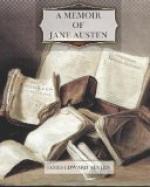Within a week of the date of this letter, in spite of the impossibility of moving, and of the fatal effects to be apprehended from the sea-air, Diana Parker was at Sanditon with her sister. She had flattered herself that by her own indefatigable exertions, and by setting at work the agency of many friends, she had induced two large families to take houses at Sanditon. It was to expedite these politic views that she came; and though she met with some disappointment of her expectation, yet she did not suffer in health.
Such were some of the dramatis personae, ready dressed and prepared for their parts. They are at least original and unlike any that the author had produced before. The success of the piece must have depended on the skill with which these parts might be played; but few will be inclined to distrust the skill of one who had so often succeeded. If the author had lived to complete her work, it is probable that these personages might have grown into as mature an individuality of character, and have taken as permanent a place amongst our familiar acquaintance, as Mr. Bennet, or John Thorp, Mary Musgrove, or Aunt Norris herself.
CHAPTER XIV.
Postscript.
When first I was asked to put together a memoir of my aunt, I saw reasons for declining the attempt. It was not only that, having passed the three score years and ten usually allotted to man’s strength, and being unaccustomed to write for publication, I might well distrust my ability to complete the work, but that I also knew the extreme scantiness of the materials out of which it must be constructed. The grave closed over my aunt fifty-two years ago; and during that long period no idea of writing her life had been entertained by any of her family. Her nearest relatives, far from making provision for such a purpose, had actually destroyed many of the letters and papers by which it might have been facilitated. They were influenced, I believe, partly by an extreme dislike to publishing private details, and partly by never having assumed that the world would take so strong and abiding an interest in her works as to claim her name as public property. It was therefore necessary for me to draw upon recollections rather than on written documents for my materials; while the subject itself supplied me with nothing striking or prominent with which to arrest the attention of the reader. It has been said that the happiest individuals, like nations during their happiest periods, have no history. In the case of my aunt, it was not only that her course of life was unvaried, but that her own disposition was remarkably calm and even. There was in her nothing eccentric or angular; no




